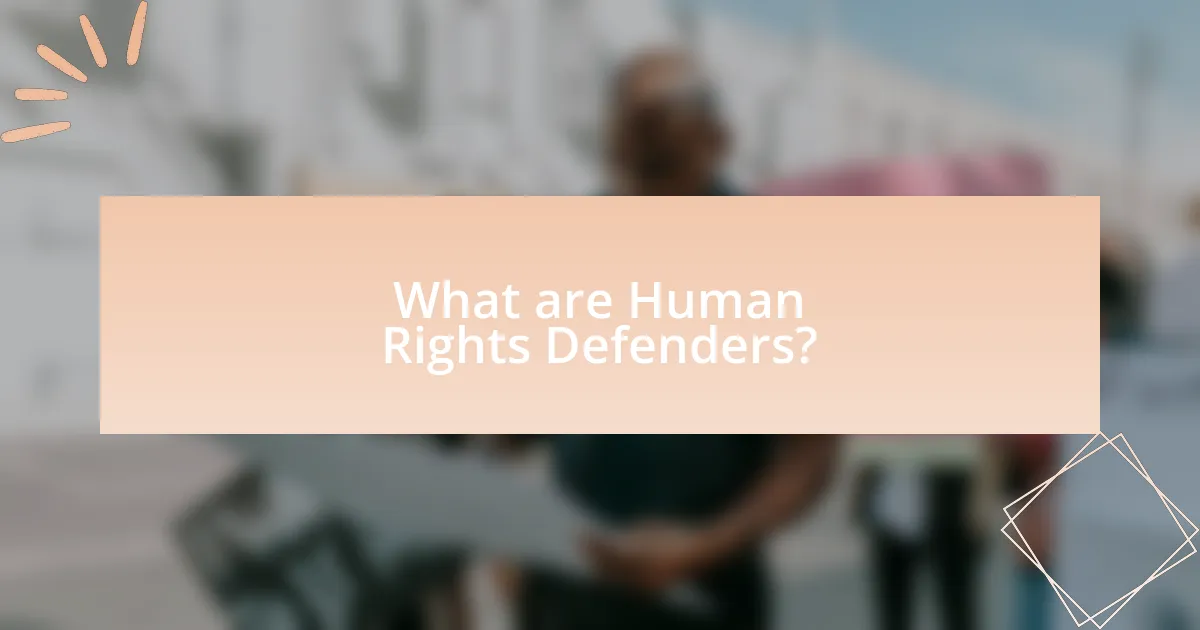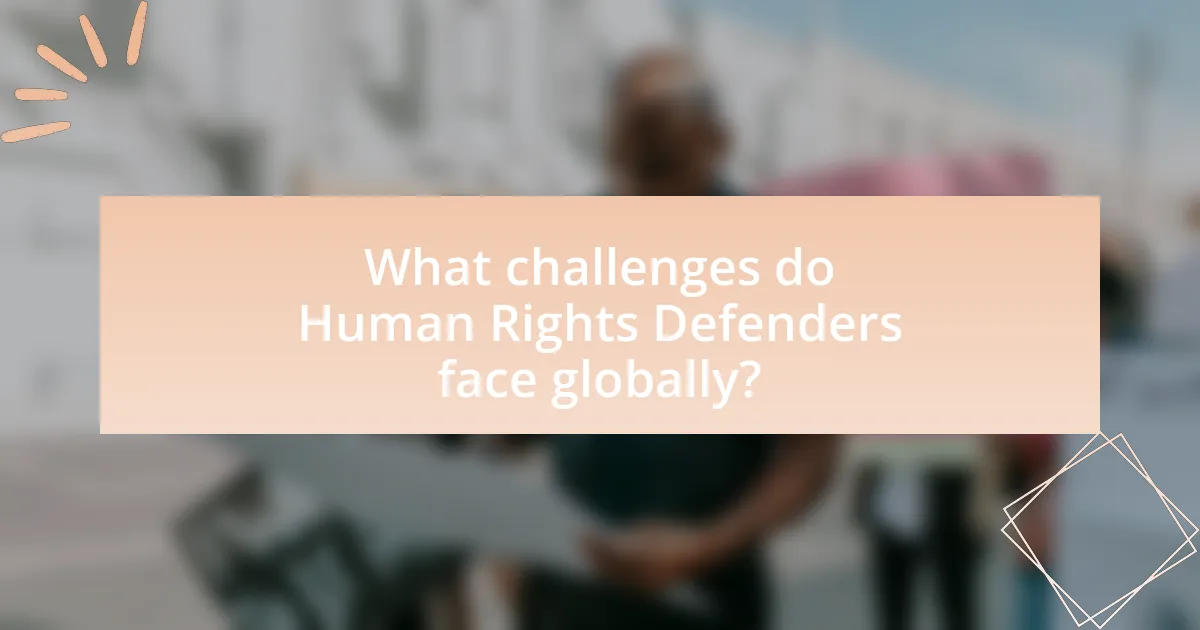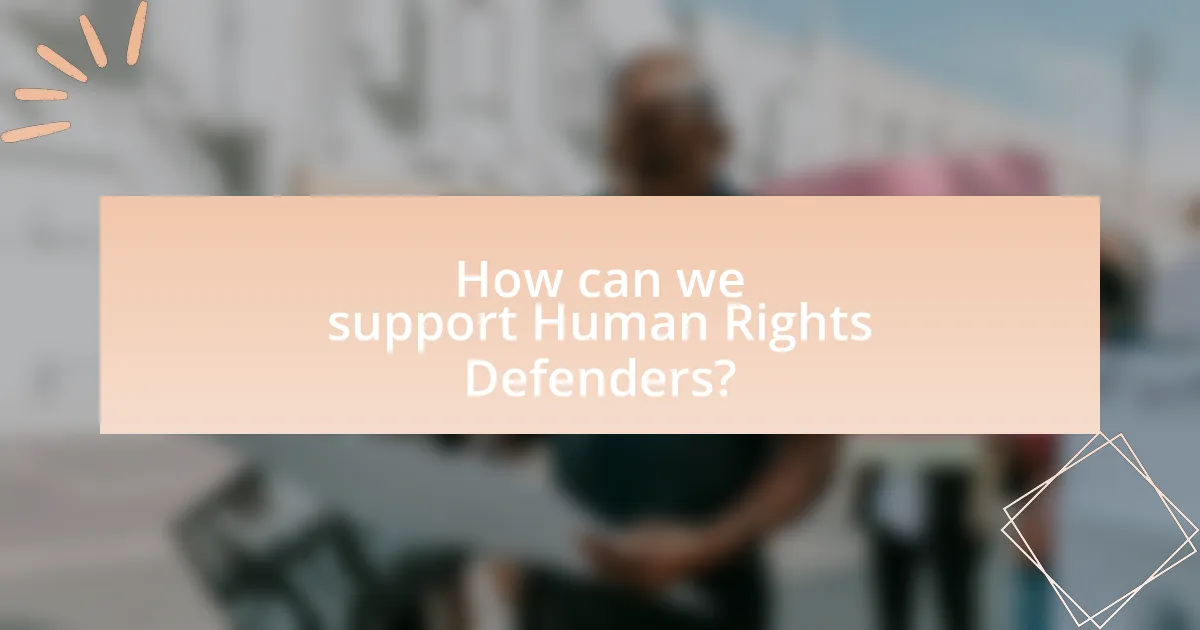Human Rights Defenders are individuals or groups dedicated to promoting and protecting human rights and fundamental freedoms, often at great personal risk. This article provides a comprehensive overview of their vital role in society, including their importance in advocating for justice, community empowerment, and holding governments accountable. It also examines the challenges they face globally, such as violence, legal harassment, and government repression, while highlighting strategies for protection and the significance of international support. Additionally, the article outlines how individuals can contribute to the safety and effectiveness of Human Rights Defenders through advocacy, funding, and awareness campaigns.

What are Human Rights Defenders?
Human Rights Defenders are individuals or groups who actively promote and protect human rights and fundamental freedoms. They work to expose violations, advocate for justice, and support victims of abuse, often facing significant risks in their efforts. According to the United Nations Declaration on Human Rights Defenders, adopted in 1998, these defenders play a crucial role in fostering a culture of human rights and accountability globally. Their work is essential for the realization of rights enshrined in international treaties, such as the Universal Declaration of Human Rights, which emphasizes the importance of protecting those who seek to uphold human dignity and justice.
Why are Human Rights Defenders important in society?
Human Rights Defenders are crucial in society because they advocate for the protection and promotion of fundamental rights and freedoms. They play a vital role in holding governments and institutions accountable, ensuring that individuals can exercise their rights without fear of repression. For instance, according to the United Nations, Human Rights Defenders contribute to the prevention of human rights violations and foster a culture of accountability and justice. Their efforts often lead to significant legal reforms and societal changes, as evidenced by the work of defenders in various countries who have successfully challenged oppressive laws and practices.
What roles do Human Rights Defenders play in promoting justice?
Human Rights Defenders play a crucial role in promoting justice by advocating for the protection and enforcement of human rights. They engage in activities such as documenting human rights violations, providing legal assistance to victims, and raising public awareness about injustices. For instance, organizations like Amnesty International and Human Rights Watch have documented abuses and lobbied for policy changes, influencing international human rights standards. Their efforts contribute to accountability by pressuring governments and institutions to uphold human rights, thereby fostering a culture of justice and respect for the rule of law.
How do Human Rights Defenders contribute to community empowerment?
Human Rights Defenders contribute to community empowerment by advocating for the protection and promotion of human rights, which enables marginalized groups to assert their rights and participate actively in societal decision-making. They provide education on legal rights, facilitate access to justice, and mobilize communities to challenge injustices, thereby fostering a culture of accountability and civic engagement. For instance, organizations like Amnesty International report that Human Rights Defenders have successfully led campaigns that resulted in policy changes benefiting local communities, illustrating their role in enhancing community agency and resilience.
Who qualifies as a Human Rights Defender?
A Human Rights Defender is an individual who actively promotes and protects human rights, often at personal risk. This includes activists, lawyers, journalists, and community leaders who work to address injustices and advocate for the rights of marginalized groups. According to the United Nations Declaration on Human Rights Defenders, these individuals engage in peaceful activities aimed at defending human rights and fundamental freedoms, thereby contributing to the promotion of social justice and accountability.
What criteria define a Human Rights Defender?
A Human Rights Defender is defined by their active engagement in promoting and protecting human rights, often at personal risk. This role typically includes individuals who advocate for the rights of others, document human rights abuses, and seek accountability for violations. Human Rights Defenders may work within various sectors, including civil society organizations, legal frameworks, or grassroots movements, and they often focus on marginalized or vulnerable populations. The United Nations Declaration on Human Rights Defenders outlines that these individuals should be able to operate freely and safely, emphasizing the importance of their work in fostering justice and equality.
How do different cultures perceive Human Rights Defenders?
Different cultures perceive Human Rights Defenders through varied lenses shaped by historical, social, and political contexts. In Western societies, Human Rights Defenders are often viewed as essential advocates for justice and equality, supported by legal frameworks that protect their activities. Conversely, in some authoritarian regimes, these defenders may be seen as threats to state stability, leading to repression and vilification. For instance, in countries like Russia and China, Human Rights Defenders face significant challenges, including harassment and imprisonment, reflecting a cultural perception that prioritizes state control over individual rights. Additionally, in indigenous cultures, Human Rights Defenders may be revered as guardians of traditional rights and environmental justice, highlighting a positive perception rooted in community values. This diversity in perception underscores the complex relationship between cultural norms and the recognition of human rights advocacy globally.

What challenges do Human Rights Defenders face globally?
Human Rights Defenders face numerous challenges globally, including threats to their safety, legal harassment, and restrictions on their activities. These individuals often encounter violence, intimidation, and even assassination, as evidenced by reports from organizations like Front Line Defenders, which documented 331 killings of human rights defenders in 2020 alone. Additionally, many defenders face legal obstacles, such as arbitrary detention and restrictive laws that limit their ability to operate, particularly in authoritarian regimes. For instance, the International Federation for Human Rights highlights that in countries like Belarus and Russia, defenders are frequently subjected to unjust legal proceedings aimed at silencing their work. These challenges create a hostile environment that undermines the effectiveness and safety of Human Rights Defenders worldwide.
What are the common threats to Human Rights Defenders?
Common threats to Human Rights Defenders include physical violence, legal harassment, and intimidation. These individuals often face attacks from state and non-state actors aimed at silencing their advocacy efforts. For instance, according to the Front Line Defenders Annual Report, in 2020, 331 human rights defenders were killed, highlighting the extreme risks they encounter. Additionally, many defenders experience arbitrary detention and judicial persecution, which are tactics used to undermine their work and instill fear. The United Nations has documented these threats, emphasizing the urgent need for protective measures to ensure their safety and continued advocacy.
How does government repression impact Human Rights Defenders?
Government repression significantly undermines the work and safety of Human Rights Defenders. Such repression often manifests through harassment, intimidation, arbitrary detention, and violence, which directly threaten the ability of these individuals to advocate for human rights. For instance, according to the 2022 report by Front Line Defenders, 358 Human Rights Defenders were killed globally, with many of these cases linked to state actors or their affiliates. This environment of fear and violence not only silences defenders but also deters others from engaging in human rights advocacy, thereby weakening civil society and the protection of human rights overall.
What role does public perception play in the safety of Human Rights Defenders?
Public perception significantly influences the safety of Human Rights Defenders by shaping societal attitudes and responses to their work. When the public views Human Rights Defenders positively, it can lead to increased support, protection, and advocacy for their safety, as seen in countries where civil society is robust and respected. Conversely, negative public perception can result in hostility, isolation, and increased risks for these defenders, as evidenced by reports indicating that in regions where Human Rights Defenders are vilified, they face higher rates of violence and persecution. For instance, the 2021 report by Front Line Defenders highlighted that in countries with negative media portrayals of activists, there was a corresponding rise in attacks against them, underscoring the critical role public perception plays in their safety.
How do Human Rights Defenders navigate these challenges?
Human Rights Defenders navigate challenges by employing strategic advocacy, building coalitions, and utilizing legal frameworks. They often engage in grassroots mobilization to raise awareness and support for human rights issues, which enhances their visibility and influence. For instance, organizations like Amnesty International and Human Rights Watch provide resources and training to empower defenders in various regions, enabling them to effectively confront threats and violations. Additionally, they leverage international human rights laws and mechanisms, such as the United Nations Human Rights Council, to hold violators accountable and seek protection for themselves and their communities. This multifaceted approach allows Human Rights Defenders to adapt to hostile environments and continue their work despite significant risks.
What strategies do Human Rights Defenders use for protection?
Human Rights Defenders employ various strategies for protection, including legal advocacy, community mobilization, and international solidarity. Legal advocacy involves utilizing national and international laws to challenge abuses and seek justice, often supported by organizations like Amnesty International, which documents violations and provides legal assistance. Community mobilization focuses on raising awareness and building local support networks to enhance safety and resilience among vulnerable populations. International solidarity is fostered through partnerships with global human rights organizations, which can amplify their voices and provide resources, as seen in campaigns that pressure governments to uphold human rights standards. These strategies collectively enhance the safety and effectiveness of Human Rights Defenders in their work.
How can international support enhance the safety of Human Rights Defenders?
International support can enhance the safety of Human Rights Defenders by providing resources, advocacy, and protection mechanisms. This support can include funding for security measures, legal assistance, and training on risk management, which directly addresses the vulnerabilities faced by these defenders. For instance, organizations like Front Line Defenders report that financial backing allows defenders to implement safety protocols and access emergency response systems, significantly reducing their risk of violence. Furthermore, international advocacy can pressure governments to uphold human rights and protect defenders, as seen in cases where global attention has led to the release of imprisoned activists. Thus, international support plays a crucial role in creating a safer environment for Human Rights Defenders.

How can we support Human Rights Defenders?
Supporting Human Rights Defenders can be achieved through advocacy, funding, and legal protection. Advocacy involves raising awareness about their work and the risks they face, which can mobilize public support and influence policy changes. Funding is crucial, as many defenders operate in resource-limited environments; financial support can help sustain their initiatives and ensure their safety. Legal protection is essential to safeguard their rights and provide them with the necessary resources to defend themselves against harassment or persecution. For instance, organizations like Front Line Defenders report that increased funding and legal support have significantly improved the safety and effectiveness of human rights defenders in various regions.
What actions can individuals take to support Human Rights Defenders?
Individuals can support Human Rights Defenders by advocating for their rights and safety through various actions. These actions include raising awareness about their work, sharing their stories on social media, and participating in campaigns that highlight human rights issues. Additionally, individuals can provide financial support to organizations that protect and promote the rights of defenders, as many face threats and legal challenges. Engaging with local and international human rights organizations can also amplify their voices and ensure they receive necessary resources. According to the United Nations, supporting Human Rights Defenders is crucial for the promotion of democracy and the rule of law, as they play a vital role in holding governments accountable.
How can awareness campaigns help Human Rights Defenders?
Awareness campaigns can significantly aid Human Rights Defenders by amplifying their voices and increasing public support for their causes. These campaigns raise awareness about human rights violations, thereby mobilizing communities and garnering international attention. For instance, the #MeToo movement highlighted sexual harassment and violence, leading to widespread societal change and legal reforms. Such campaigns can also provide critical resources and protection for defenders facing threats, as seen in the case of the “Protect Defenders” initiative, which offers legal assistance and safety training. By fostering a more informed public, awareness campaigns create an environment where Human Rights Defenders can operate more safely and effectively.
What role do donations play in supporting Human Rights Defenders?
Donations play a crucial role in supporting Human Rights Defenders by providing essential financial resources that enable them to carry out their work effectively. These funds are often used for legal assistance, security measures, advocacy campaigns, and operational costs, which are vital for protecting human rights in various contexts. For instance, according to the report by the International Human Rights Funders Group, over 60% of human rights organizations rely on donations to sustain their activities, highlighting the dependency on external funding for their survival and impact.
What resources are available for Human Rights Defenders?
Human Rights Defenders have access to various resources, including legal aid, training programs, funding opportunities, and advocacy networks. Organizations such as the Front Line Defenders provide emergency support and protection services, while the International Federation for Human Rights offers training and capacity-building initiatives. Additionally, the United Nations Human Rights Office provides guidelines and tools to assist defenders in their work. These resources are crucial for enhancing the safety and effectiveness of Human Rights Defenders globally.
How can Human Rights Defenders access legal aid and protection services?
Human Rights Defenders can access legal aid and protection services through various mechanisms, including legal aid organizations, pro bono legal services, and government or international protection programs. These services often provide essential support in navigating legal challenges and ensuring safety. For instance, organizations like the International Federation for Human Rights and local NGOs offer resources and legal representation specifically tailored for Human Rights Defenders facing threats or legal action. Additionally, international bodies such as the United Nations have established frameworks to protect Human Rights Defenders, which include access to legal assistance and protective measures.
What networks exist to connect Human Rights Defenders globally?
Several networks exist to connect Human Rights Defenders globally, including the International Federation for Human Rights (FIDH), the World Organization Against Torture (OMCT), and Front Line Defenders. These organizations facilitate collaboration, provide resources, and advocate for the protection of human rights defenders. For instance, FIDH has over 190 member organizations in more than 100 countries, which enhances its capacity to support defenders worldwide. Additionally, Front Line Defenders offers emergency support and advocacy for individuals at risk, demonstrating its commitment to safeguarding human rights activists.
What best practices can enhance the effectiveness of Human Rights Defenders?
Best practices that can enhance the effectiveness of Human Rights Defenders include establishing strong networks for collaboration, ensuring access to legal support, and providing comprehensive training on human rights laws and advocacy strategies. Strong networks facilitate information sharing and collective action, which can amplify their impact. Access to legal support is crucial for navigating legal challenges and protecting defenders from harassment or persecution. Training equips defenders with the necessary skills to effectively advocate for human rights, as evidenced by organizations like Amnesty International, which has documented that well-trained defenders are more successful in their campaigns.
How can collaboration among Human Rights Defenders improve outcomes?
Collaboration among Human Rights Defenders can improve outcomes by enhancing resource sharing, increasing visibility, and amplifying advocacy efforts. When Human Rights Defenders work together, they can pool their knowledge, skills, and networks, leading to more effective strategies for addressing human rights violations. For instance, joint campaigns can reach broader audiences, as seen in the 2018 global campaign against the detention of human rights activists, which mobilized support across multiple countries and resulted in significant international pressure on governments. This collective action not only raises awareness but also fosters solidarity, making it harder for violators to act with impunity.
What training programs are beneficial for Human Rights Defenders?
Training programs beneficial for Human Rights Defenders include legal training, advocacy skills development, and security awareness courses. Legal training equips defenders with knowledge of international human rights law, enabling them to effectively navigate legal frameworks and protect rights. Advocacy skills development enhances their ability to influence policy and mobilize communities, while security awareness courses provide essential strategies for personal safety and risk management in hostile environments. These programs are supported by organizations like the International Federation for Human Rights and the Office of the United Nations High Commissioner for Human Rights, which emphasize the importance of capacity building for effective human rights work.